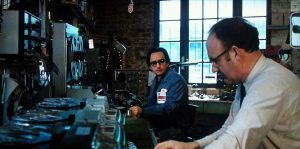Written and Directed by Francis Ford Coppola
Starring
– Gene Hackman as Harry Caul
– John Cazale as Stan
– Allen Garfield as Bernie Moran
– Fredrick Forrest as Mark

Some films exist solely as mindless entertainment; juggling noise, color, and state of the art effects in order to provide a few hours of harmless distraction. Others, plot-heavy and overly reliant on incident and contrivance, keep the audience guessing with last-minute revelations and wild reversals of fortune. However, as a lasting form of cinema, the “film of ideas” — vague, ambiguous, subtle in form and execution — leaves an impression that is not easily dismissed. “The Conversation,” a cinematic highlight of the greatest of all film decades (the 1970s), boldly explores ideas not as engines to drive the plot forward, but rather as valuable pursuits in their own right; challenges to the viewer to consider unfamiliar philosophical questions and possibilities.
Coppola’s genius in this film is to provide a skeleton plot (surveillance expert hears something disturbing on a tape, pursues the “truth” behind the mystery) while emphasizing character insight and social examination. The idea, strongly felt, is paranoia — the crippling, consuming inability to connect with other human beings or an external reality out of fear and, at bottom, a misanthropic distrust of mankind. Harry Caul (an understated, stunning Gene Hackman), the central focus of Coppola’s disturbing vision, strains for a near-impossible level of detachment from his work, much to the chagrin (and frustration) of his co-workers. Several attempt conversation, but Caul is the epitome of professionalism (“All I care about is getting a big, fat recording”).
He claims that he is above listening to the subjects of his surveillance, but a new assignment brings about unfamiliar guilt (largely because he is reminded of a previous case where his work indirectly caused the deaths of several people). He continually reminds himself (and others) that he is not responsible for the harm that might come to others (after all, he does his work, exchanges it for cash, and moves on to the next assignment), but deep in his mind (and conscience), he knows all-too-well how invasions of privacy stimulate rage, revenge, and often end in violence.
Given that this film was released in 1974 (just as Watergate was winding down toward Nixon’s resignation), it no doubt stimulated comparisons to that real-life event. However, rather than remaining a dated curiosity, the film serves as a frightening metaphor for our own age; a time of media saturation, corporate hegemony, and the sanctification of hedonism. Given such an environment, privacy vanishes not only as a reality, but also as an ideal. We are, as stated in “Rear Window,” a race of peeping toms, fascinated by personal revelation and heretofore behind-the-scenes activity. From sexual interaction to bathroom behavior, few things are kept secret, largely out of our desire to “expose” and destroy (which acts as a leveling effect). Coppola’s ability to foresee the ubiquity of surveillance cameras (at work, in stores, schools, and parking lots), wire-taps (Linda Tripp, anyone?) and private investigators speaks to his understanding of human nature. We are a nation of confession and unwarranted revelation; reveling in our release of dirty secrets and self-serving detail.
Still, “The Conversation” resonates today because it reveals an essential truth about American life — we simply do not trust each other. Either out of cynicism or solipsistic arrogance (we do not believe we can or should ever know the reality of another), Americans increasingly seek refuge from input and interaction. This is an interesting turn of events given our obsession with revelation, but it does in fact exist, contradictions and all. Harry Caul, so full of paranoia that he is content to pursue sexual relationships of absolute anonymity (even his “girlfriend” is a stranger), is our Everyman. Hypocritical in that he insists on personal privacy while investigating others; self-righteous in that he insists on moral absolution and detachment despite criminal behavior; and sufficiently dehumanized to live in a barren wasteland of humorless avoidance (he has the pleasure of a saxophone, yet his apartment is nothing more than a holding cell). He has taken disconnection to its frightening, logical conclusion: besieged by loneliness, any human contact we desire must be surreptitiously acquired — without risk, without confrontation, and ultimately without meaning.
In all, a one-of-a-kind masterpiece.
Ruthless Ratings:
- Overall: 10
- Direction: 10
- Acting: 10
- Story: 10
- DVD Extras: A wonderful commentary track from Coppola.
- Re-watchability: 10